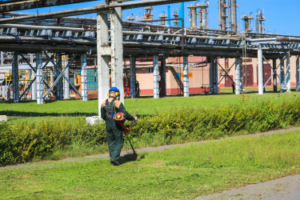Block managers form an essential role within the overall block management and block maintenance programmes. Rental property inspections are vital for a number of reasons, and ensuring that they are carried out on a regular basis is crucial to maintaining good-quality block, multi-unit rental property stock, and for continuing relationships with both landlords and tenants. In the longer term, these site inspections can have a positive impact on property values, too.
In this article, we are going to explore the key reasons why regular site maintenance inspections are incredibly important for block managers, and discuss how we at Dependable can help you!
Identifying Maintenance Concerns
Identifying maintenance issues before they become a major or costly problem is one of the primary reasons for block managers to carry out property inspections. Depending on the size and style of the properties, small issues in one area can easily impact wider areas, such as water leaks which are not addressed early. Another example would be peeling paint on external walls. As well as having a negative effect on the aesthetics of the building, it could have more serious consequences if left, such as structural implications due to exposure to the elements.
Regular maintenance inspections for blocks of flats or offices will ensure that the property is kept in a good condition, secure and, providing the issues spotted are dealt with in a timely manner, will extend the lifespan of the building’s components – such as the plumbing and heating systems; fire and security systems and the roof. This will also ensure the property will maintain its value over time, too.
The block manager is likely to manage any Maintenance Schedule which will include site inspections, but these should be in addition to ad hoc visits.
Compliance to Regulations
Verifying compliance regulations on an ongoing basis is essential to any block management, and should be done on a proactive basis. Health and Safety standards must be adhered to; fire safety regulations, and any other local or national guidelines should be followed. It is also important for block managers to stay up to date with any new regulations or amendments to current rulings, to ensure they don’t end up in hot water.
Ensuring appropriate measures are taken to make repairs, or implement or update requirements during property inspections to keep within regulations will prevent potential penalties or adverse legal implications.
Regular inspections also have the benefit of allowing the block manager to check that tenancy agreements are being complied to; no illegal activities are taking place, as well as demonstrating that the landlord is fulfilling their responsibilities.
Health, Safety and Security
In addition to legal regulations and guidelines, there is an overall duty of care for landlords and their block managers to ensure a safe and secure environment for their tenants. Block managers are responsible for ensuring that security measures – access controls, CCTV systems, emergency lighting etc. – are in order and providing effective and adequate security for the protection of tenants and the building. Insurers often insist on proof of regular inspections and servicing of such systems in the event of any claims.
There is a responsibility by landlords to ensure that any property rented out is fit for human habitation. The block manager has an important role to play in ensuring that the site remains safe and habitable.
Communications and Relationships
Block managers are responsible for the relationships with tenants and contractors. These relationships should not be underestimated. Regular rental property inspections give the block manager more opportunities to meet with tenants and address any concerns that they may have before they turn into complaints. Building relationships in this way usually means that tenants will be more open to giving feedback, making suggestions or reporting faults and issues, thus making the block manager’s life easier and ensuring that acceptable maintenance levels are maintained. Such interactions will also build trust with the tenants, showing that their opinions are valued, which, in turn, will build and maintain a positive reputation for the block manager and the block management company represented.
Contractors are more likely to work effectively and efficiently if a block manager is regularly on site. The block manager has the opportunity to assess the quality of the work and ensure that all requirements are met. By building positive relationships with contractors, the block manager can also negotiate favourable terms, speed up repairs and ensure that the landlord and tenants receive the best workmanship and service.
How can Dependable help?
A block manager who carries out regular site and property inspections will confirm that a property is maintained to an acceptable standard, ensure compliance, create and maintain a safe and secure living or working environment and will be able to address tenants’ concerns in a timely manner, improving landlord-tenant relations. Proactive block management, including full inventory management, will not allow issues to fester and therefore provide landlords with the best returns.
Here at Dependable, we offer both hard and soft facilities management. With a team of experts who carry out inspections, inventories, and check-ins of properties, as well as a team of in-house maintenance experts, we can provide a quality block management service to our clients, whether their portfolio consists of a single block, or a number of different locations. Contact us today to discover our different services and discuss how we can help you with your block management.




